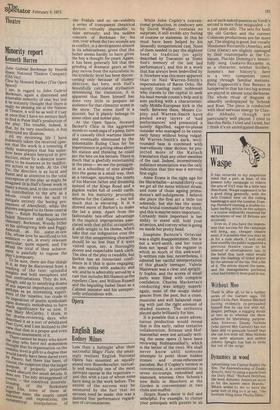Theatre
Minority report
Kenneth Hurren
John Gabriel Borhman by Henrik Ibsen; National Theatre Company (Old Vic) Claw by Howard Barker (The Open Space) I am, in regard to John Gabriel Borkrnan, again a distressed and miserable minority of one; but lest it be instantly thought that there is really no pleasing me at the National Theatre, it will be as well if I say at once that I have no serious fault to find in Peter Hall's production of the play. The trouble, indeed, is that by its very excellence, it has destroyed my illusions. All my reviewing life I have indolently taken the received opinion that the work is a towering if Chilly masterpiece that has somehow been always betrayed in production, either by a director insensitive to its nuances or by indifferent actors or by both. At the Old Vic, the direction is as lucid and fluent and as attentive to the total conception of the play as might be imagined (it is Hall's finest work in m, any a moon, and, in the context of nis contribution to the arts as a Whole, could even be said to mitigate entirely the boring pretensions of Ahenfield), while the Players assigned to its three central roles — Ralph Richardson as the failed financier and Napoleonic visionary, Borkman, Wendy Hiller as his unforgiving wife and Peggy Ashcroft as his sister-in-law Ella, whose love he sacrificed to his arnbition — are, in every relevant Particular, quite superb; and I'm afraid the total of their achievement is painfully to expose the Play's pomposity.
To be sure, there are fine things lh it, as may be discovered from a reading of the text: splendid insights and bold metaphors and taut confrontations. They do not, though, add up to satisfying drama of any especial importance, except Perhaps as an interesting experiMent of the 'nineties, too crude in Its imposition of poetic symbolism tiPon domestic melodrama to have
much significance for us now. It yvas— Maly McCarthy, I think, in
her drama reviewingdays, who described it as a sort of debilitated peer Gynt, and I am inclined to the view that that is a proper and even generous assessment of it. There cannot be many who know the Play who have not sometimes `nought that its organisation on the realistic level is glib to a degree that Would hardly have been dared even by Pinero; but there has been, of "ourse, the suspicion that the larger Purpose, if properly projected, ‘yould obscure the small details. It a_ oes not. The tidy arrangement of tyents — the contrived interrelac'hshiP of the Borkmans With Ella, none of them al'together sane; the neatly timed entrances and expositions; the sYmmetrical interpolation of
the Foldals and so on—exhibits a series of transparent theatrical devices virtually impossible to take seriously; and the sudden concern of Borkman for his son, over whom the two women are in conflict, is a development absurd in its arbitrariness, given that the father seems hardly to have given the boy a thought for years. Again, it has been generally felt that the grinding of dramatic gears as the play moves from the naturalistic to the symbolic level has been disconcerting only because of clumsy direction; but here, with Hall's beautifully calculated stylisation minimising the transition, it is apparent that Ibsen himself has done very little to prepare an audience for that climactic scene in the snow. The scene itself is a stunner, but it plainly belongs to some other and nobler play. At the Open Space, Howard Barker's Claw is the aggrieved womb-to-tomb saga of a pimp, born of a casually illicit wartime liaison and eventually eliminated by the indomitable Ruling Class for his impertinence in getting ideas above his station and thinking he could put the bite on his betters. There is much that is gleefully entertaining in the piece — we see the protagonist as a schoolboy of nine already into the game in a small way, then as a teenager, spurning the tenets of his Marxist father and dreaming instead of the Kings Road and a pigskin wallet full of credit cards, and in his maturity procuring whores for the Cabinet — but not much that is elevating. It is a shrewd move of Barker's to make the lad a pimp. Apart from the fashionable box-office advantage in the implicit improprieties associated with that pitiful occupation, it adds weight to his theme, which asks that our indignation over the fate of this unappetising character should be no less than if it were visited upon, say, a thoroughly decent and respectable bank clerk. The idea of the play is twaddle, but Barker has an insouciant confidence in it that is quite engaging; he also writes with audacity and wit; and he is admirably served by a cast that includes Bill Hamon as the repellent Claw, and William Russell and the beguiling Isabel Dean as a Cabinet minister and his unexpectedly unfastidious wife.


































 Previous page
Previous page